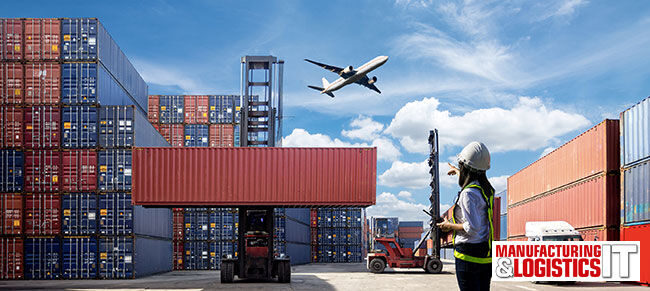By Jason McLean, freelance writer.
Learn how digital freight forwarding platforms are transforming the logistics industry. Discover the benefits of increased transparency, automation, and sustainability, and find out how you can reduce costs and improve delivery times.
The supply chain management industry has been in dire need of an overhaul for a long time, with the advent of digital technology and the rise of the Logistics 4.0 era. The growing need for transparency and efficiency in supply chain management has driven the digital transformation of the logistics industry.
A Grand View Research report calculates that digital freight forwarding platforms’ market size is expected to reach USD 19.7 billion by 2027. In addition, it shows an increasing demand for cost-effective and efficient supply chain management solutions and the need to address traditional logistics methods’ challenges, such as manual processes, limited visibility, and high costs.
Digital platforms have emerged as key players in revolutionising supply chain management, offering businesses a range of benefits, including increased transparency, automation, sustainable logistics, reduced costs, and improved delivery times. This article will explore the benefits of digital freight forwarding platforms and the competition in the industry.
What is a digital freight forwarding platform?
A digital freight forwarding platform streamlines logistics by automating procurement, transportation, and delivery tasks. Also, it connects shippers, carriers, and drivers in real time and helps ease their supply chain operations. The traditional logistics processes involve manual work, increasing human error risk. Digital freight forwarding platforms are fully automated, reducing manual processes and minimising the risk of errors. In addition, these platforms use sophisticated technologies such as Artificial Intelligence, Machine Learning, the Internet of Things (IoT), and Big Data Analytics to provide a seamless logistics experience.
All in one marketplace
Also, a digital freight forwarding platform offers a huge database of potential customers and various services, such as:
- shipping cost calculators
- quotes
- invoicing management
- tracking and monitoring services
In addition, automation reduces manual processes, allowing users to focus on the more critical aspects of their business and providing valuable insights to make informed decisions and reduce costs.
Key advantages of digital freight forwarding platform
Digital freight forwarding platforms have revolutionised the logistics industry by offering businesses a range of added value benefits. It provides a centralised engine for all logistics operations, including:
- cargo tracking
- documentation management
- shipment planning
By utilising digital freight forwarding platforms, businesses can improve their logistics operations’ efficiency, cost-effectiveness, and overall performance.
A single efficient platform for all logistics operations
Digital freight forwarding platforms provide a single platform for all logistics operations, making it easier for shippers and carriers to manage their supply chain. It is designed to streamline the shipping process and make it more efficient, reliable, and cost-effective. The platform integrates multiple functionalities into a single, user-friendly interface. This eliminates the need for businesses to rely on multiple tools or systems, reducing complexity and improving the accuracy of logistics processes. As a result, businesses can achieve greater control over their supply chain, improve customer satisfaction, and drive growth by using a digital freight forwarding platform.
A huge database of potential customers
The platform provides access to a huge database of potential customers, making it easier for shippers and carriers to find new business opportunities and scale. With a wide range of tools and features, businesses can easily connect with potential customers, manage relationships, and build their brand presence. As a result, businesses can increase their visibility, reach new markets, and grow their customer base by leveraging the database of potential customers offered by a digital freight forwarding platform.
Competitive price
The platform provides competitive prices, making it easier for shippers and carriers to find the best deals. In addition, it provides access to a wide range of shipping options and value-added services, allowing businesses to make informed decisions about their logistics efficiency. As a result, it reduces costs and improves delivery times. In a recent survey by Gartner (2022), over 70% of businesses reported a reduction in shipping costs due to digital freight forwarding platforms.
Automation is a new reality in logistics
The platform automates many repetitive and time-consuming tasks involved in the shipping process. Automation also enables businesses to handle larger shipments with fewer resources, freeing up time and resources for other important tasks. For example, digital freight forwarding platforms use algorithms to optimise shipping routes, reducing logistics operations’ carbon footprint and improving supply chain management’s overall efficiency. This increased efficiency and reduced cost positively impact businesses, allowing them to stay competitive and make their operations more sustainable.
In addition, the platform’s real-time updates and notifications allow businesses to stay informed of any issues or delays, enabling them to take corrective action quickly and minimise disruptions to their supply chain. Security features protect sensitive information, such as shipment details and customer data, ensuring the privacy and confidentiality of business operations. By using a digital freight forwarding platform, businesses know that their shipments are monitored and protected at all times.
Increased transparency
One of the primary benefits of digital freight forwarding platforms is their increased transparency in logistics operations. The platform’s dashboard and reporting capabilities provide businesses with a comprehensive view of their logistics operations, allowing them to monitor and analyse key performance metrics. By using a digital freight forwarding platform, businesses can increase the transparency of their logistics operations and make more informed decisions.
Making an impact with sustainable logistics
Sustainability is a major concern in the logistics industry, and digital freight forwarding platforms are helping to promote it. By reducing the carbon footprint of logistics operations and improving supply chain management efficiency, they are reducing the number of trucks on the road, improving air quality, and reducing waste. According to World Bank, digital freight forwarding platforms have the potential to reduce carbon emissions in the logistics industry by up to 20% (Gartner, 2022).
What could AI do with digital freight forwarding platforms?
Artificial Intelligence is a big thing in all industries, and it has the potential to transform the logistics industry by providing advanced analytics, predictive modelling, and real-time data. This can help shippers and carriers make informed decisions, reducing costs and improving supply chain efficiency. It could automate procurement, transportation, and delivery tasks, reducing manual processes and minimising errors.
With its advanced algorithms and machine learning capabilities, AI can automate and optimise many of the manual tasks involved in the shipping process, such as cargo tracking, documentation management, and shipment planning. AI can also provide real-time insights and recommendations based on data analysis, allowing businesses to make informed decisions quickly and effectively. In addition, AI can enhance security by detecting and preventing fraud and cyber attacks in real time. By integrating AI into digital forwarding platforms, businesses can benefit from increased efficiency, cost savings, and improved decision-making.
The future of logistics is digital
In conclusion, the rise of digital freight forwarding platforms is revolutionising supply chain management and transforming the logistics industry. With benefits such as increased transparency, automation, sustainable logistics, reduced costs, and improved delivery times, it is no wonder that businesses are rapidly adopting these platforms. While competition between traditional logistics and digital platforms continues to grow, it is clear that digital platforms are the preferred choice for businesses looking to optimise their supply chain and stay ahead of the competition. The future of logistics is digital, and businesses embracing this change will be well-positioned to succeed.



